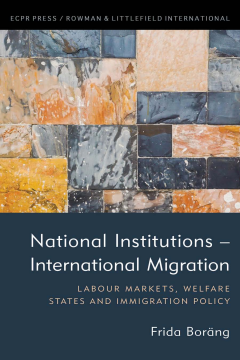
Additional Information
Book Details
Abstract
Despite the fact that immigration policy is today one of the most salient political issues in the OECD countries, we know surprisingly little about the factors behind the very different choices countries have made over the last decades when it comes to immigrant admission. Why has the balance between inclusion and exclusion differed so much between countries – and for different categories of migrants? The answer that this book provides is that this is to an important extent a result of how domestic labour market and welfare state institutions have approached the question of inclusion and exclusion, since immigration policy does not stand independent from these central policy areas. By developing and testing an institutional explanation for immigrant admission, this book offers a theoretically informed, and empirically rich, analysis of variation in immigration policy in the OECD countries from the 1980s to the 2000s.
This book successfully explores the relationship between migration and the welfare state. It presents a rich and novel account of the role of institutional arrangements and demonstrates that forced migration and labour migration differ in how they relate to the welfare state. Its strength lies in the fruitful combination of assorted data alongside a carefully crafted analysis and a high sensitivity for case-specific contexts.
Steffen Mau, Professor of Macrosociology, Humboldt-University Berlin
Frida Boräng is Assistant Professor at the Department of Political Science and Research Fellow at the Quality of Government Institute (QoG) at the University of Gothenburg.
How and why immigration and immigration policies vary across countries are key questions for research and public policy debates. In this excellent book, Frida Boräng explores the important links between national institutions and immigration policies. It is a major contribution to research on migration, welfare states, labour markets, and comparative political economy.
Martin Ruhs, Associate Professor of Political Economy, University of Oxford
Frida Boräng’s new book on labor markets, welfare states, and international migration is a must-read. With great care, Boräng analyzes the important differences between different kinds of migration and develops new explanations of the intricate relationship between national political and economic institutions on the one hand and migration policies on the other. The place of national social rights in a world of mass migration is one of the most critical political issues of our time. If you are tired of the ideologues on television and looking for some serious scholarship, this book is for you.
Johannes Lindvall, Professor of Political Science, Lund University
In this highly sophisticated analysis, Frida Boräng manages to shed new light on a very important and intriguing question, namely how a country’s immigration policy is related to its social and labor market institutions. With an impressive command of the field, she manages to present a clear and compelling result that will have a profound impact in research as well for public policy.
Bo Rothstein, Political Scientist, Sweden
Table of Contents
| Section Title | Page | Action | Price |
|---|---|---|---|
| National Institutions – International Migration | Cover | ||
| Contents | v | ||
| List of Tables and Figures | vii | ||
| Acknowledgements | ix | ||
| 1 Introduction | 1 | ||
| 2 Immigration policy through the lens of comparative political economy and comparative welfare state research | 17 | ||
| 3 Patterns of immigration | 51 | ||
| 4 Labour market institutions and the labour market orientation of immigration | 89 | ||
| 5 Welfare state institutions and openness towards forced immigrants | 115 | ||
| 6 Conclusion | 149 | ||
| Appendix 1: Measuring inflows of labour immigrants | 163 | ||
| Appendix 2: Radical right parties | 167 | ||
| Appendix 3: Robustness tests inflows of labour immigrants | 169 | ||
| Appendix 4: Robustness tests inflows of forced immigrants | 171 | ||
| Bibliography | 173 | ||
| Index | 189 | ||
| About the Author | 195 |
